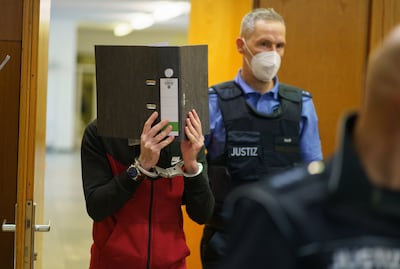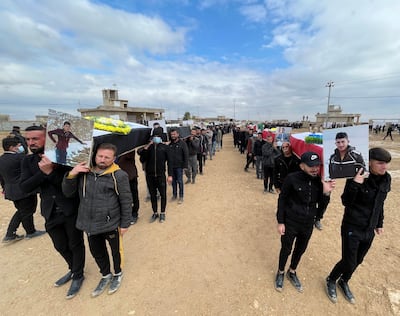Nobel laureate Nadia Murad is urging countries across the globe to replicate Germany’s historic move in prosecuting ISIS members for genocide.
Germany this week became the first nation to convict an ISIS member for genocide against the Yazidi community.
Ms Murad, a Yazidi survivor of atrocities committed by ISIS, described the verdict as a win for survivors and called for other nations to follow suit.
More than 10,000 Yazidis were killed when ISIS swept through northern Iraq in 2014 and about 7,000 women and girls were enslaved, many of whom are still missing.
Ms Murad said Germany's "use of universal jurisdiction in this case can and should be replicated by governments around the world".
“The verdict is a win for survivors of genocide and the entire Yazidi community. Germany is not only raising awareness about the need for justice but is acting on it,” she said.
Taha Al Jumailly, 29, an Iraqi ISIS member, was sentenced to life in jail after being found guilty of genocide, crimes against humanity resulting in death, war crimes, aiding and abetting war crimes and bodily harm resulting in death, after joining the terrorist group in 2013.
He was accused of enslaving a Yazidi mother and her daughter, 5.
The child died of heatstroke after she was chained outside — without food or water — in Fallujah in the summer of 2015 when temperatures reached 50°C, as punishment for wetting the bed when she was ill. Al Jumailly also prevented them from practising their religion.

In a separate trial in Munich in October, Al Jumailly’s ex-wife Jennifer Wenisch was sentenced to 10 years in jail for crimes against humanity and her role in the child's death.
Wenisch was convicted for "crimes against humanity in the form of enslavement" and aiding and abetting the girl's death by failing to offer help. She did not face genocide charges.
The mother and child were from a village in Sinjar, which was attacked by ISIS in August 2014.

The judgment in Germany was the first time a court had used the word "genocide" to describe what happened to the Yazidi community.
Germany has used the legal principle of universal jurisdiction, which allows for prosecution even if alleged offences were committed in a foreign country.
ISIS massacred thousands of Yazidi men and older women in 2014 and left them in mass graves.
The militants then took young boys to train as child soldiers and girls as sex slaves.
The UN’s Investigative Team to Promote Accountability for Crimes Committed by ISIS, or Unitad, is working to exhume the mass graves left by the terrorist group.
There are more than 200 mass graves containing up to 12,000 bodies in Iraq, which are attributed to ISIS.


